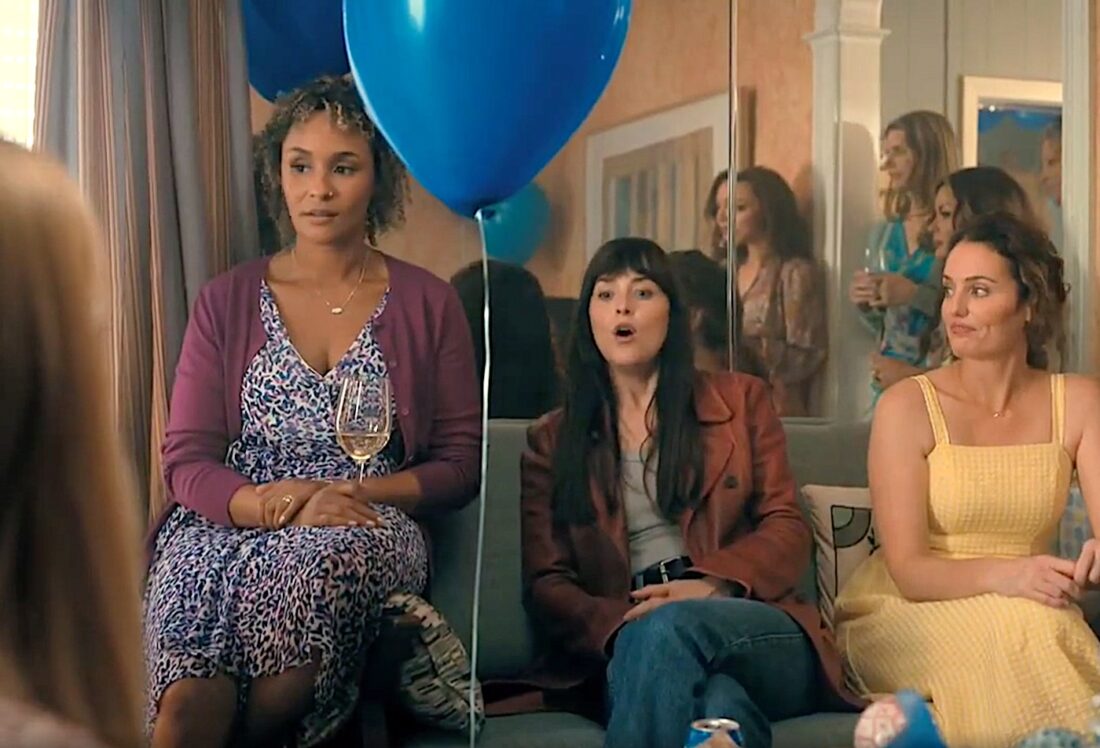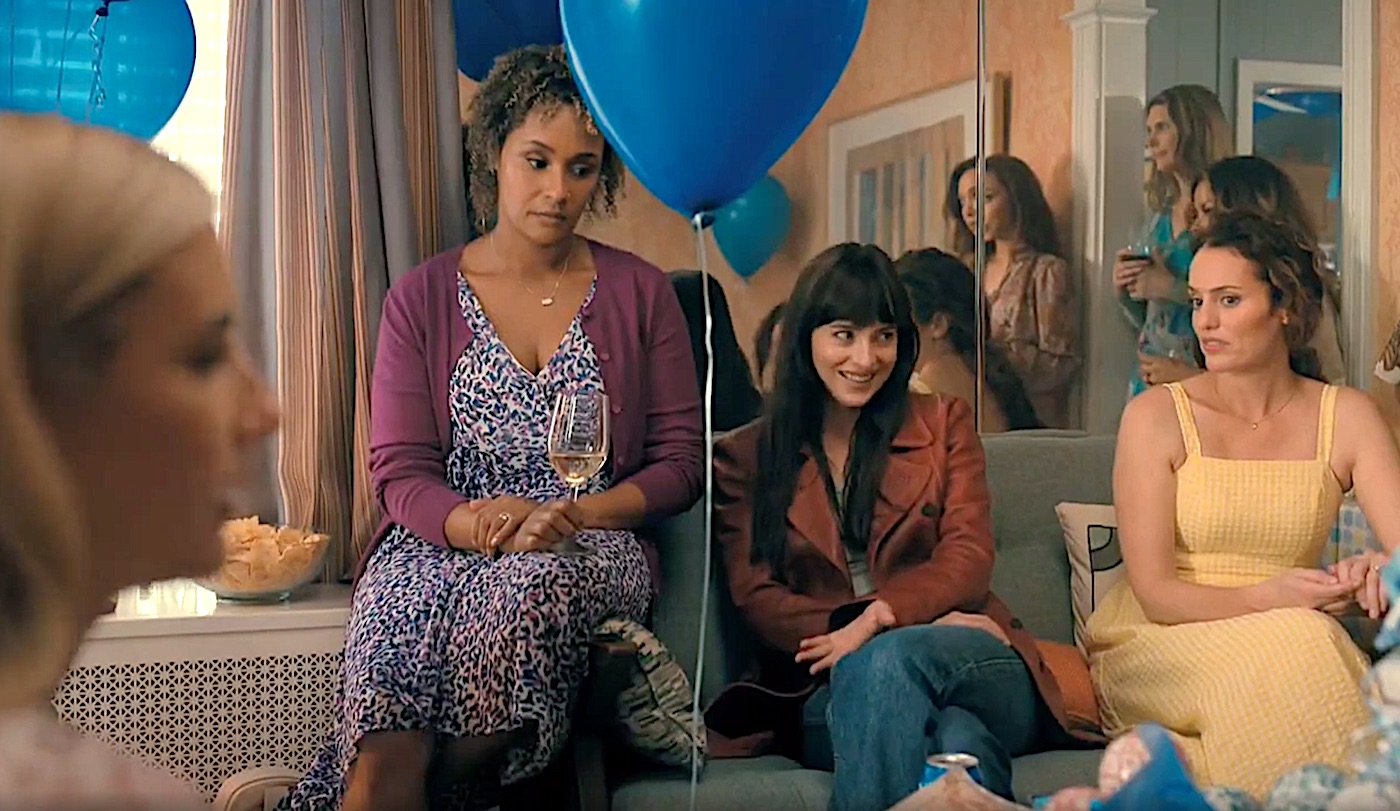About 20 minutes into Madame Web there’s a scene that so startlingly good that I’ve had to rewatch the film several times to make sure I didn’t imagine it.
This is Madame Web. We’ve talked about the iconic press tour, the terrible ADR, the way the best line isn’t even in the movie. JP Brammer has made high Twitter ART from this film. But somehow, there is on this is one scene in the movie that hit me as weirdly, perfectly, emotionally true.
Granted, this might just be me.
But I’ve never seen it expressed anywhere as well as here.
I previously invited the Venezuelan Spiders from Arachnophobia to review the film—I thought they’d have better insights than I did. (And I was right, but apologies to anyone who was bitten in that theater.) The one thing they didn’t really speak to was this scene, because, being spiders, their social structures are completely different and it probably sailed right over their adorable fuzzy heads. I hope they don’t mind if I follow up on their essay.
(Spoilers for the greatest movies of the 21st Century, by the way.)
The day after Cassandra Webb dies, gains psychic powers, and comes back to life, she goes to a party at her coworker’s house. The coworker? Her partner-in-paramedic-ing, Ben Parker. The party? A baby shower for his sister-in-law, Mary. Ben has convinced her to come, assuring her she can hang out with her friends, the other paramedics.
Cassandra arrives at the party, and at first she hangs out at the grill with the people she’s actually friends with, Ben and their fellow paramedics. She asks for something to drink, and is given product placement a can of Pepsi. (Her repeated requests for beer are ignored, which is weird and infantilizing, but never fear, it gets much worse.) A few minutes later, her coworker O’Neil’s wife, Susan, comes put and tells her—and only her—“We’re ready to start,” and as Cassandra looks at her in confusion, Ben adds, “They’re starting, you should get in there.”
This is when it becomes clear that it’s a full-on baby shower. The men are staying out by the grill. The women—all the women—are expected inside the house.
She looks back at him and he smiles and says, referring to all of her earlier worries: “No, you were right, they’re roping you in.” As she snaps a deadpan “Thank you” at him, he replies, “You’re welcome! Have fun!”
As she comes into the kitchen, she introduces herself to Ben’s sister-in-law, Mary—because she’s never even met her. Everyone she knows is out at the grill, and they’re making her participate in the shower with a roomful of strangers. She says the only thing she can possible say in this situation, which is “Ben is so excited about being an uncle”, which also happens to be the funniest fucking thing you could ever say in a Spider-Man adjacent film. (Mary grimaces as Fetal Parker kicks her; “He never stops leaping around in there,” she says, implying that she’s actually pregnant with Batroc, The Leaper, since spiders don’t really leap so much.)
Cassie follows up with a sentence I’ve uttered many times, to many a prospective parent: “Does it have a… name? The…?” and she waves her hand vaguely wombwards. And for a moment Mary’s expression mirrors many of my own friends’, as we watch her process the fact that this person just called her baby “it”, and seems to be only showing the barest polite interest rather than squealing and cooing like the other people at the party.
Which, look. I get that the film is playing this scene for laughs, and showing the Cassie is socially awkward (and it gets worse in a minute, just wait) but I also legitimately felt seen by this scene.
I like kids, once they’re, you know, out. And have personalities. There are several children in my life right now who I’d step in front of a truck for. But while they’re still baking? When they’re little wrinkly shrimp creatures? It’s just not my bag, man. And while saying this makes me feel like I’ve fully come off my hinges, I have to speak my truth: Madame Web is possibly the first movie I’ve ever seen that shows this particular interaction between women, and takes the point-of-view, and side, really, of the one with no kids.
And then Mary replies to Cassie with a sentence that struck an icicle dagger in my heart: “We’re saving that for one of the games.”
I have over the years been strong-armed into the communal experience of my perceived gender. There were times when, like Cassandra Webb, I explicitly said I didn’t want to share these experiences. My refusal was treated either as a joke I was making (bad!) or as simply irrelevant (worse!). There was the time a wedding DJ yelled at me and tried to refuse to do the bouquet toss until I joined the line of young-ish people who looked like me. (I did not join.) There was the time all the not-pregnant people at a baby shower had to hold glasses of ice water, tiny plastic babies, pink as flamingos, suspended in the cubes: if your baby defrosted first you “won” the next pregnancy. As I was handed a glass, older women, all mothers and grandmothers, hooted and hollered about which of us would be next. (I’m pretty sure I put my glass down on an end-table and went to the bathroom.)
I attended these events, and a lot more like them, because I cared about the people who were the stars of the shows. I was happy that they cared enough about me to include me in their Special Day—and to be clear, this still makes me happy. But that doesn’t mean that I want the same type of Special Day. It didn’t mean that I wanted to be part of a public or semi-public ritual that involved at least some element of embarrassment or coercion, I just wanted to cheer my friends on and eat cake. Maybe dance idiotically.
And want to be very clear: I’m not talking about people who are all on the same page. A group of gal pals having an uproarious night at a strip club, the wedding I attended where the bride handed her bouquet to a lifelong friend, a mom-to-be giggling as her friends bedecked her with bows from her gifts—these can be great! There’s a reason these traditions have lasted. But also, there are many reasons they’ve lasted, and some of those involve social coercion. When one person at the bachelorette is insisting on phallus necklaces when the bride-to-be vehemently doesn’t want them, where a mortified girl has to lift her dress and let a strange dude roll the bride’s garter up her thigh in front of a roomful if shrieking wedding-goers. (Both things I’ve seen, by the way!) The reason Madame Web (Madame Web???) touched off this cascade of associations is because it’s the first movie I’ve seen (and I’ve watched a lot of romcoms) that explicitly deals with this. And it does it from the point-of-view of the person who really wants to support the mom-to-be, but also wants to opt out of the gendered performance.
I’d be remiss if I didn’t mention the clothing. Cassie, thinking she was coming to a barbecue to hang out with her work friends, is wearing early-’00s bootcut jeans, a t-shirt, and a leather jacket. She’s surrounded by women in sundresses in every shade of the Easter basket. (I’m not kidding—literally there’s one other person in jeans, and one in like, ruffle-y white culottes. Everyone else is sun-dressed, hair-styled, manicured, and make-upped.)
The game they play seems to be “write a fond memory of your mom on a slip of blue paper, and Mary will read from it and guess who wrote it.” (The paper is blue, and all the balloons are blue, because the unnamed baby is a BOY, you see.) Finally, she pulls a blank piece of paper, and Cassie cops that it’s hers. Since Cassie’s mom notoriously died in the Amazon, where she was studying spiders, Cassie doesn’t have any memories to share.
So, was this game compulsory? Did everyone have to put a slip of paper in? My guess, given my own life experience, is yes, and that rather than lie and make something up, or announce to the roomful of strangers why she couldn’t participate, she dropped a blank piece in and hoped for that Mary would overlook it.
Obviously that doesn’t happen, and when she admits the blank slip is hers, another woman tells her that she must have a fond memory of her mom.
“My mother actually died uh, in childbirth,” Cassandra Webb says, and laughs, immediately trying to lighten the mood, then realizes she’s saying this to a pregnant woman. She hastily follows up with: “Death in childbirth is super rare…. I mean she chose to be way deep in the Amazon in her final month of pregnancy, hundreds of miles from any med facility, so—”

None of these women apologize for making her play the game, or for putting her on the spot. She says she turned out OK without a mom, clearly trying to reassure everyone, but no one offers reassurance or anything remotely resembling a condolence. Mary is the only one who tries for a sympathetic expression rather than open horror—but she’s [SCRIBBLE]’s mom, so of course she’s nice.
For the next game they try to guess the name of Mary’s baby. But since no one in Madame Web is allowed to say her looming infant’s name due to rights issues—THIS FILM IS A MASTERPIECE—the blue balloons keep popping every time someone almost says [BLACK SHARPIE SMUDGE].
Do you ever have the thing where you’re overwhelmed with joy that you’ve lived long enough to experience something? I guess for some people it’s the Grand Canyon, or falling in love, or, given this very scene, having a child. For me, it’s seeing Madame Web.
It’s heavily implied that Cassandra’s shiny new psychic powers have told her the name because Dakota Johnson says “Hmmm?” like she’s thinking REALLY HARD about names for a baby, and a balloon explodes right next to her, and then just as Mary opens her mouth to say “Peter” two more explode at like, “the-fireworks-factory-is-engulfed-in-flames” volume. Except then it turns out that this entire scene is one of Cassandra’s psychic flashes (which she doesn’t know she gets yet), and when she asks: “Didn’t we just do this?” it gives the other women another chance to treat her like a freak.

Fortunately, there is actually a fire, down at the docks, and she and Ben have to go rescue people.
This entire scene is only three-and-a-half minutes long, but it feels like it’s from a different movie. Here Dakota Johnson’s relentless deadpan becomes a wry commentary on a role she’s unwilling to play. Her dark, casual New Yorker clothing contrasts with the popping pastels of the other women. Her social awkwardness is both explained away—she didn’t have a mom—and empathized with—these women who don’t know her are gawping at her for not having a mom. And in the end, she’s called away, back into the life and career she’s chosen—a life and career that none of the women (who all seem to know each other already) have asked about.
In the context of the party, it doesn’t matter that she’s a paramedic who can drive at a breakneck pace through one of the biggest cities in the world to literally save people from death, or that all of her actual friends are out at the grill—all that matters is that she falls on the “girl” side of the gender binary, which means she’s supposed to act like the other “girls”.
The reason that this scene hit me so hard is that it became clear to me, after a couple of gender dysphoria hoedowns, that the games and rituals were all about telling me that I, as myself, am not enough. I’m supposed to catch a bouquet, so I can move on to the status of “married”, or find a drowned plastic baby in ice-melt water, so I can move on to the state of “mother”. The fact that I’ve never wanted to be married or a mother has always been treated as a joke I’m making, or a phase I’ll grow out of. Or, even funnier to me, as a delusion—surely I’ll come to my senses and realize that my priorities are all wrong! Surely I’ll realize that the life I’ve built over years, around writing, and art, and friendship, and being in my own mind, alone, testing my thoughts against the work of other writers (so, actually, not alone) is incomplete.
The reason this scene hit me so hard is that the rest of the movie takes that thesis and runs with it. Cassandra completely overturns her own life to care for three teenage girls. Since they’re all, conveniently, unparented, she also has to invite them to live with her. And in the end, she even has a super specific vision/visitation from her mom, where she learns that her mom only chose to be way deep in the Amazon in her final month of pregnancy in order to find a cure for a degenerative condition that Baby Cassie had. Mama Webb risked her health and her life and eventually got shot while studying spiders, all for her child; Cassandra Webb achieves her final superheroic form (kind of) by risking her life for the teens, losing her sight, and adopting the girls. She becomes a Mom at about the same time Mary gives birth to [REDACTED].
The rest of the movie repudiates everything that made the baby shower scene jagged and interesting.
What gets me is that every decision in Madame Web seems to have been made by a person whose only exposure to film came when a movie played with the sound off in a bar, and they half-watched it while they got blackout drunk. The next day, in the haze of the hangover, they decided to make a film of their own.
So how, HOW, did they manage to create one scene that’s so specific and true?

